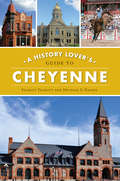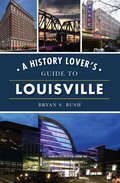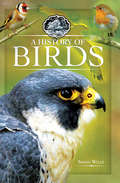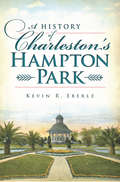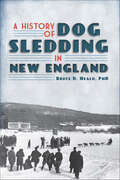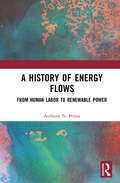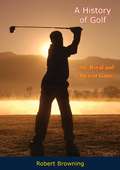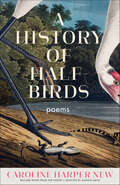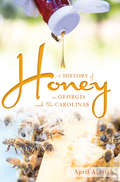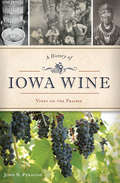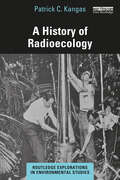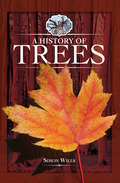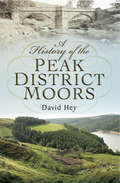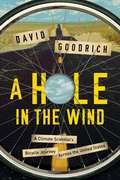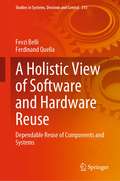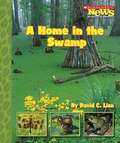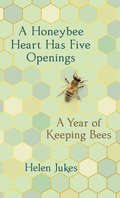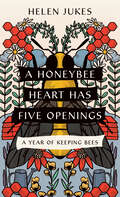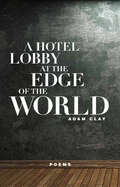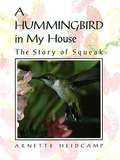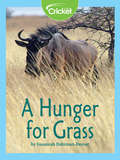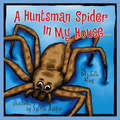- Table View
- List View
A Hike in the Park (Fountas & Pinnell Classroom, Guided Reading)
by Susan Gal Anne SoubyNIMAC-sourced textbook. On the Trail. Molly and Mom play a game while they are hiking. Read to find out what they are looking for and what they find.
A History Lover's Guide to Cheyenne (History & Guide)
by Starley Talbott Michael E. KasselCelebrating at their encampment near Crow Creek on July 4, 1867, railroad surveyors named the settlement after the local Cheyenne tribe. By the time the Union Pacific Railroad arrived in November, the town had grown from a tent city to a "Hell on Wheels" town of ten thousand souls. Cattle barons brought herds to graze the open range, while they reposed in mansions on Millionaires Row. By 1890, the gleaming dome of the new capitol building was visible all the way down Capitol Avenue to the majestic Union Pacific Railroad Depot. Authors Starley Talbott and Michael Kassel explore a rich past, including the origins of the F.E. Warren Air Force Base, the foundation of the world's largest outdoor rodeo and the unheralded history of early aviation that eclipsed Denver.
A History Lover's Guide to Louisville (History & Guide)
by Bryan S. BushGateway to the South. Home of the Kentucky Derby and Churchill Downs. Louisville has a rich history, beginning with the city's discovery by General George Rogers Clark. The city played an important role in the Civil War, and during the Gilded Age, it became the Bourbon Capital of the World. During World War I, the city hosted 47,500 troops at Camp Zachary Taylor. During World War II, the U.S. Naval Ordnance Plant contributed to the war effort, making rounds for big guns during the late war. Author Bryan S. Bush takes the reader on a journey to discover the history of Louisville through the historic sites and locations from far past to the present day.
A History of Birds
by Simon Wills“Intriguing stories from the history of the human relationship with birds, including their symbolism in art, literature, religion, and folklore” (Booklist). Even the most well-informed wildlife enthusiast will be entertained by the stories and fascinating facts in this beautifully illustrated book. Our ancestors hunted, tamed, worshipped, and depicted birds, and even bestowed magical properties upon them. Why did ancient writers consider the sparrow a lustful creature? Which bird was killed and hung up to predict the weather? And what was an “arse-foot?” Wildlife photographer and history journalist Simon Wills explores the intriguing and at times bizarre stories behind our relationship with birds. Find out why robins feature on Christmas cards, and how Mozart was persuaded to keep a pet starling. What bird did Florence Nightingale carry around in her pocket? How did the blue tit get its name? Whole careers have been created around birds—from falconers to ostrich farmers—and birds have had great symbolic importance too. Discover, for example, why Raleigh bicycles carry a heron logo and why church lecterns are in the shape of an eagle. If you enjoy wildlife, then this book is full of surprises. Pigeons were trained to carry messages in wartime, but could gulls be taught to hunt U-boats? And which American president’s parrot started swearing at his funeral? “A pleasing and often illuminating book with many examples of historical connections with birds, from Queen Victoria’s parrots and the Prince of Wales’s feathers to Kellogg’s cockerel and recipes for flamingos.” —Bird Watch
A History of Charleston's Hampton Park
by Kevin R. EberleMost visitors to Charleston never venture far enough north to discover what residents claim as the most appealing public open space on the peninsula. Hampton Park is completely unexpected in this city famous for highly manicured gardens with clipped lawns, sculpted shrubs and precise designs hidden behind massive walls and iron gates. Hampton Park's naturalistic character was created as an antidote to the cramped conditions of the lower peninsula, and it still offers open fields of grass, walking trails, shade trees and overflowing flower beds. But the story is not that simple--it began more than three hundred years ago with Native Americans and involves early plantation life, Revolutionary War battles, horse racing, the Civil War, industrial development, civic spectacle, professional baseball, a zoo and disco.
A History of Dog Sledding in New England (Sports)
by Bruce D. Heald PhDSled dogs trot through expanses of sparkling white snow, pulling a musher and energetically surging with the command, "Let's go!" From puppies to seasoned competitors, sled dogs partner with mushers in a passionate pursuit of a great racing tradition. The renowned and formidable Laconia World Championship Sled Dog Derby, the New England Sled Dog Club and famous drivers like Dr. Charles Belford--who came in fifth place at Laconia at the age of seventeen--helped solidify the fame of New England sled dog trails. Historian Bruce D. Heald celebrates the best of the sport in the region, from the feats of legendary Arthur Walden and his famous Chinook dogs to the Siberian huskies' contribution to the World War II effort. Join Heald as he charts the legacy of this remarkable sport.
A History of Energy Flows: From Human Labor to Renewable Power
by Anthony N. PennaThis book presents a global and historical perspective of energy flows during the last millennium. The search for sustainable energy is a key issue dominating today’s energy regime. This book details the historical evolution of energy, following the overlapping and slow flowing transitions from one regime to another. In doing so it seeks to provide insight into future energy transitions and the means of utilizing sustainable energy sources to reduce humanity’s fossil fuel footprint. The book begins with an examination of the earliest and most basic forms of energy use, namely, that of humans metabolizing food in order to work, with the first transition following the domestication and breeding of horses and other animals. The book also examines energy sources key to development during the industrialization and mechanization, such as wood and coal, as well as more recent sources, such as crude oil and nuclear energy. The book then assesses energy flows that are at the forefront of sustainability, by examining green sources, such as solar, wind power and hydropower. While it is easy to see energy flows in terms of “revolutions,” transitions have taken centuries to evolve, and transitions are never fully global, as, for example, wood remains the primary fuel source for cooking in much of the developing world. This book not only demonstrates the longevity of energy transitions but also discusses the possibility for reducing transition times when technological developments provide inexpensive and safe energy sources that can reduce the dependency on fossil fuels. This book will be of great interest to students and scholars of energy transitions, sustainable energy and environmental and energy history.
A History of Golf: The Royal and Ancient Game (Golf Classics Ser.)
by Robert BrowningHere is a book which should prove a valuable and every welcome addition to the literature of Golf!Written in a fluent and easy style that makes reading a pleasure, this new history has the merit of literary quality, and the author’s quiet, unobtrusive sense of humour eliminates the slightest suspicion of dullness or heaviness, without in any way detracting from the seriousness of his objective or the dignity and importance that even the most rabid devotee of the Royal and Ancient would claim for it. The work also provides ample evidence of the author’s industry and research, and, in keeping with his position as editor of Golfing, conveys a quiet assurance of authority.The book deals with every aspect of the history of the game, from its earliest beginnings to the modern era of American ascendency. There are 34 chapters and a chronological table covering 600 years from 1353 to the 1950’s. We select here, more or less at random, a few of the subjects dealt with: Seven successive monarchs of the Stuart line as players—The golf of the House of Windsor—Golf as a cross-country game—The Celtic hurley, and the Belgian chole—The Scots game and the Dutch—The origin of golfing terms—Golf before the formation of clubs—Competitions came before clubs—The beginning of the championships—The start of the university match—How golf came to London—The golf boom of the gay nineties—The beginning of golf in America—The evolution of the professionals—Women’s golf originally a part of the feminist movement—Clubs and balls; wooden balls; the old featheries; the coming of the ‘gutties’; the arrival of the rubber core—Course construction—The rise of the golf architects—The evolution of the rules—American thoroughness makes golf a science instead of an art—International golf; the Walker, Ryder, and Curtis Cups—The game as a preserver of ancient landmarks—The genius of golf, the only game in which the worst player gets the best of it.
A History of Half-Birds: Poems
by Caroline Harper NewSelected by Maggie Smith for the 2023 Ballard Spahr Prize for Poetry, this debut collection of poems explores the aftermath of history’s most powerful forces: devotion, disaster, and us.Rooted in the Gulf Coast, A History of Half-Birds measures the line between love and ruin. Part poet, part anthropologist, Caroline Harper New digs into dark places—a cave, a womb, a hurricane—to trace how violence born of devotion manifests not only in our human relationships, but also in our connections to the natural and animal worlds. Everywhere in these pages, tenderness is coupled with brutality: a deer eats a baby bird, a lover restrains another. “I promised / a love poem,” New proclaims, then teaches us about the anglerfish, how it “attracts its mate / and prey with the same lure.”In New’s exceptional voice, familiar concepts take on a shade of the fantastic. A woman tastes the earth for acidity, buries lemons and pennies for balance. Limestone “sucks the sea / into little demitasse” and hyacinths “sip the sun / black.” A lone elephant wanders into the wilderness of rural Georgia, never to be seen again. But perhaps most arresting about New’s work are the truths told by its strangeness, like the ancient fish who “carved their shape” in a mountain’s peak, or a mother who wears a lifejacket in the bathtub.Crafted by New’s voracious mind and carried by her matchless lyricism, A History of Half-Birds is a stunning investigation of love’s beastly impulses—all it protects, and all it destroys.
A History of Honey in Georgia and the Carolinas (American Palate)
by April AldrichIn the late 1800s, Georgia and the Carolinas produced millions of pounds of honey and created a lasting legacy within the industry. The uses for the sweet nectar go well beyond flavor. Bee pollination extensively benefits agricultural crops in the area. Elements from the beehive are commonly used in popular cosmetics, medicines and mead. Beekeepers also face serious challenges like Colony Collapse Disorder. Join author and beekeeper April Aldrich as she traces the delectable history of honey and beekeeping throughout the region, from ancient apiaries to modern meaderies and beyond.
A History of Iowa Wine: Vines on the Prairie (American Palate)
by John N. PeragineIowa has a history with grapevines that goes back more than a century. New York lawyer Hiram Barney obtained a tract of land in southeast Iowa as part of the Half-Breed program following the American Indian Wars and created the White Elk Winery. German settlers in Amana tended community vineyards for communal wines. Before Prohibition, the Council Bluffs Grape Growers Association grew grapes and shipped them eastward by the ton. In the early 1900s, the state was among the nation's top producers of grapes. Pesticides, weather and government subsidies ended the time of the vines of the prairie until their recent return. Author John N. Peragine details the rise, fall and resurgence of the industry in the Hawkeye State.
A History of Radioecology (Routledge Explorations in Environmental Studies)
by Patrick C. KangasThis book presents a history of radioecology, from World War II through to the critical years of the Cold War, finishing with a discussion of recent developments and future implications for the field. Drawing on a vast array of primary sources, the book reviews, synthesizes and discusses the implications of the ecological research supported by the Atomic Energy Commission (AEC) of the United States government, from World War II to the early 1970s. This was a critical period in the history of ecology, characterized by a transition from the older, largely descriptive studies of communities of plants and animals to the modern form of the science involving functional studies of energy flow and mineral cycling in ecosystems. This transition was in large part due to the development of radioecology, which was a by-product of the Cold War and the need to understand and predict the consequences of a nuclear war that was planned but has never occurred. The book draws on important case studies, such as the Pacific Proving Grounds, the Nevada Test Site, El Verde in Puerto Rico, the Brookhaven National Laboratory and recent events such as the nuclear disasters at Chernobyl and Fukushima. By revisiting studies and archived information from the Cold War era, this book offers lessons from the history of radioecology to provide background and perspective for understanding possible present-day impacts from issues of radiation risks associated with nuclear power generation and waste disposal. Post-Cold War developments in radioecology will be also reviewed and contrasted with the AEC-supported ecology research for further perspectives. This book will be of great interest to students and scholars of radioecology, environmental pollution, environmental technology, bioscience and environmental history.
A History of Trees
by Simon WillsMake Arbor Day every day with little known and intriguing facts about the plants that populate our forests, give us shade, and clean our air. Have you ever wondered how trees got their names? What did our ancestors think about trees, and how were they used in the past? This fascinating book will answer many of your questions, but also reveal interesting stories that are not widely known. For example, the nut from which tree was predicted to pay off the UK&’s national debt? Or why is Europe&’s most popular pear called the &“conference&”? Simon Wills tells the history of twenty-eight common trees in an engaging and entertaining way, and every chapter is illustrated with his photographs. Find out why the London plane tree is so frequently planted in our cities, and how our forebears were in awe of the magical properties of hawthorn. Where is Britain&’s largest conker tree? Which tree was believed to protect you against both lightning and witchcraft? The use of bay tree leaves as a sign of victory by athletes in ancient Greece led to them being subsequently adopted by many others—from Roman emperors to the Royal Marines. But why were willow trees associated with Alexander Pope, Napoleon Bonaparte, and Samuel Johnson? Why did Queen Anne pay a large sum for a cutting from a walnut tree in Somerset? Discover the answers to these and many other intriguing tales within the pages of this highly engrossing book.
A History of the Peak District Moors
by David Hey&“A superb new book . . . explores the history of Britain&’s first National Park from the Stone Age to the modern day . . . lavishly illustrated.&”—Reflections Magazine The moors of the Peak District provide some of the finest walking country in England. The pleasure of rambling across them is enhanced by a knowledge of their history, ranging from prehistoric times and the middle ages to their conversion for grouse shooting and the struggle for the &“right to roam&” in modern times. This distinctive landscape is not an untouched, natural relic for it has been shaped by humans over the centuries. Now it is being conserved as part of Britain&’s first National Park; much of it is in the care of The National Trust. The book covers all periods of time from prehistory to the present, for a typical moorland walk might take in the standing stones of a prehistoric stone circle, a medieval boundary marker, a guide stoop dated 1709, the straight walls of nineteenth-century enclosure, a row of Victorian grouse butts, a long line of flagstones brought in by helicopter, and very much more besides. &“This is no &‘desk-based study&’ but the product of a lifetime of living, working and researching in or immediately adjacent to the moors.&”—The Local Historian &“David writes with a contagious enthusiasm. This generously illustrated book roams amongst the best—and lesser-known—moorland features . . . a guide par excellence.&”—Peak Advertiser &“Few tomes can have been quite as comprehensive as David&’s. Within these pages are Romans and Vikings, railways and canals, ramblers and World War Two soldiers.&”—The Star (Sheffield)
A Hole in the Wind: A Climate Scientist's Bicycle Journey Across The United States
by David GoodrichAn epic bicycle journey across the American hinterland that explores the challenges of climate change alongside a diverse array of American voices. After a distinguished career in climate science as the Director of the UN Global Climate Observing System in Geneva, David Goodrich returned home to the United States to find a nation and a people in denial. Concerned that the American people are willfully deluded by the misinformation about climate that dominates media and politics, David thought a little straight talk could set things right. As they say in Animal House, he decided that "this calls for a stupid and futile gesture on someone's part, and I'm just the guy to do it." Starting on the beach in Delaware, David rode his bike 4,200 miles to Oregon, talking with the people he met on the ultimate road trip. Along the way he learned a great deal about why climate is a complicated issue for many Americans and even more about the country we all share. Climate change is the central environmental issue of our time. But A Hole in the Wind is also about the people Dave met and the experiences he had along the way, like the toddler's beauty pageant in Delaware, the tornado in Missouri, rust-belt towns and their relationship with fracking, and the mined-out uranium ghost town in Wyoming. As he rides, David will discuss the climate with audiences varying from laboratories to diners to elementary schools. Beautifully simple, direct, and honest, A Hole in the Wind is a fresh, refreshing ride through a difficult and controversial topic, and a rich read that makes you glad to be alive.
A Holistic View of Software and Hardware Reuse: Dependable Reuse of Components and Systems (Studies in Systems, Decision and Control #315)
by Ferdinand Quella Fevzi BelliThis book focuses on software reuse and the chances, dependability tests and recommendations for best reuse practice. A short introduction of the Ecodesign of hardware is given combined with the latest update of relevant EU legislation and standardization. It also describes the combination of different states of software in a E&E system in order to guarantee dependability of the product to be resold.
A Home In The Swamp
by David C. LionHave you ever visited a swamp? It's warm in a swamp, and the ground is wet. Swamps are home to many interesting plants and animals! This book explores the swamp while helping young readers build their vocabulary.
A Honeybee Heart Has Five Openings: A Year of Keeping Bees
by Helen JukesAn inspiring, up-close portrait of tending to a honeybee hive—a year of living dangerously—watching and capturing the wondrous, complex universe of honeybees and learning an altogether different way of being in the world."As strange, beautiful, and unexpected, as precise and exquisite in its movings as bees in a hive. I loved it."--Helen Macdonald, author of H Is for Hawk A Honeybee Heart Has Five Openings begins as the author is entering her thirties and feeling disconnected in her life. Uneasy about her future and struggling to settle into her new house in Oxford with its own small garden, she is brought back to a time of accompanying a friend in London—a beekeeper—on his hive visits. And as a gesture of good fortune for her new life, she is given a colony of honeybees. According to folklore, a colony, freely given, brings good luck, and Helen Jules embarks on a rewarding, perilous journey of becoming a beekeeper. Jukes writes about what it means to &“keep&” wild creatures; on how to live alongside beings whose laws and logic are so different from our own . . . She delves into the history of beekeeping and writes about discovering the ancient, haunting, sometimes disturbing relationship between keeper and bee, human and wild thing. A Honeybee Heart Has Five Openings is a book of observation, of the irrepressible wildness of these fascinating creatures, of the ways they seem to evade our categories each time we attempt to define them. Are they wild or domestic? Individual or collective? Is honey an animal product or is it plant-based? As the author&’s colony grows, the questions that have, at first compelled her interest to fade away, and the inbetweenness, the unsettledness of honeybees call for a different kind of questioning, of consideration. A subtle yet urgent mediation on uncertainty and hope, on solitude and friendship, on feelings of restlessness and on home; on how we might better know ourselves. A book that shows us how to be alert to the large and small creatures that flit between and among us and that urge us to learn from this vital force so necessary to be continuation of life on planet Earth.
A Honeybee Heart Has Five Openings: A Year of Keeping Bees
by Helen JukesA Honeybee Heart Has Five Openings begins as Helen Jukes is entering her thirties and struggling to settle into her new job and home. Then friends gift her a colony of honeybees—a gift that, according to folklore, brings good luck—and Jukes embarks on the rewarding, perilous journey of becoming a beekeeper.Jukes writes about what it means to "keep" wild creatures and to live alongside beings whose laws of life are so different from our own. She delves into the history of beekeeping, exploring the ancient—and sometimes disturbing—relationship between keeper and bee, human and wild thing. And as her colony grows, the very act of beekeeping seems to open new perspectives, making her world come alive again. A beautifully wrought meditation on uncertainty and hope, feelings of restlessness and home, and how we might better know ourselves, A Honeybee Heart Has Five Openings shows us how to be alert to these small creatures flitting among us that are yet so vital a force for the continuation of life.
A Horse Called Dragon (Dragon #1)
by Lynn HallA fictional life of the real wild stallion, Dragon, who was taken from Mexico's Sierra Madre mountains to become one of the founding sires of the Pony of the Americas breed in the United States.
A Horse of Her Own
by Annie WedekindFourteen-year-old Jane Ryan has always dreamed of having a "horse of her own" -- but so long as she gets to ride her favorite school horse, Beau, at Sunny Acres farm, she's content. And this is the summer she means to try out for the advanced riding class. But just as camp begins, Jane receives heartbreaking news about Beau. She loses, not just her favorite horse, but also her chance to ride in the end-of-summer competition. When her trainer asks for her help with an out-of-control chestnut warmblood, Lancelot, a newcomer to the barn, she has no choice but to say yes. There's another new addition to the farm: Ben Reyes, the grandson of the barn's manager. As Jane struggles to go on without Beau, and to make Lancelot the great horse she believes him to be, her feelings for Ben, her relationships with the privileged group of girls she rides with, and her painful, joyous road to self-discovery all lead to a heart-pounding conclusion that is truly a new beginning. Only Jane's faith in Lancelot, and her own rediscovered skill and strength, can see her through the hard journey toward "a horse of her own".
A Hotel Lobby at the Edge of the World: Poems
by Adam Clay“At the edge of the world, you’ll want to have this book. The final lines of Adam Clay’s poem, ‘Scientific Method,’ have been haunting me for weeks.” —Iowa Press-CitizenThe distilled, haunting, and subtly complex poems in Adam Clay’s A Hotel Lobby at the Edge of the World often arrive at that moment when solitude slips into separation, when a person suddenly realizes he can barely see the place he set out from however long ago. He now sees he must find his connection back to the present, socially entangled world in which he lives. For Clay, reverie can be a siren’s song, luring him to that space in which prisoners will begin “to interrogate themselves.”Clay pays attention to the poet’s return to the world of his daily life, tracking the subtly shifting tenors of thought that occur as the landscape around him changes. Clay is fully aware of the difficulties of Thoreau’s “border life,” and his poems live somewhere between those of James Wright and John Ashbery: They seek wholeness, all the while acknowledging that “a fragment is as complete as thought can be.” In the end, what we encounter most in these poems is a generous gentleness—an attention to the world so careful it’s as if the mind is “washing each grain of sand.”“Poems that are in turn clear and strange, and always warmly memorable.” —Bob Hicok“These poems engage fully the natural world . . . even as they understand the individual’s exclusion from it.” —Publishers Weekly
A Hummingbird in My House
by Arnette HeidcampAnyone who has fallen under the spell of the hummingbird will treasure this lovable true story of a young ruby-throated hummingbird who becomes part of someone's household and life. 57 full-color photographs; 10 black-and-white drawings.From the Hardcover edition.
A Hunger for Grass
by Susannah Buhrman-DeeverThe wildebeests of the Serengeti follow the grass as it grows throughout the year.
A Huntsman Spider In My House . . .
by Michelle Ray“Delightful and charming . . . Deliver[s] a valuable lesson on treating all such creatures with respect, without falling into the trap of being preachy.” —Kiddiespace A Huntsman Spider in My House features a young girl concerned about the huge unwelcome guest in her room. Rather than reacting by immediately killing the spider, as commonly taught by society, she finds another way: She catches the Huntsman instead, and then releases it outside to let it live and contribute to the ecosystem of Australian fauna. The little girl’s actions show that insects are important, necessary, not so scary, and support the world too. “The young, nameless female protagonist of Sylvie Ashford’s charming book speaks in rhyme as she explains the habits of Huntsman Spiders to children as well as to the adults that read the book aloud . . . We thoroughly endorse educating young children to have more tolerance for the lower beasts.” —What’s That Bug? “The story follows her beautifully simplistic childlike thought process as she explores her feelings about it, and the ways in which the spider could be dealt with . . . It leaves you with a deep sense of satisfaction, and provides a practical fear-resolution solution to which kids of all ages can relate.” —Kiddiespace “Michelle Ray, author of A Huntsman Spider in My House, does a wonderful job weaving a story to teach young children not to be afraid.” —The Education Cafe

